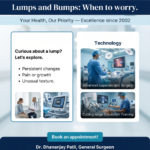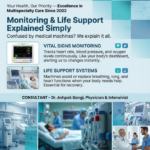Cataracts are a prevalent eye condition, particularly affecting older adults, characterized by a gradual clouding of the eye’s lens that impairs vision. Over time, they can significantly affect vision, making everyday tasks challenging. But how can you tell when it’s the right time to seriously consider cataract surgery? Here are the key signs that indicate surgery may be necessary.
Blurred or Cloudy Vision
One of the first symptoms of cataracts is blurred or cloudy vision. It may feel like you’re looking through a foggy window, even if you’re wearing glasses. This issue occurs when the lens of the eye becomes clouded, making it difficult to see clearly. If you notice this symptom worsening over time, it may indicate the need for cataract surgery.
Increased Sensitivity to Light
Another common sign of cataracts is increased sensitivity to light. Bright lights, including sunlight and headlights from cars, may seem overwhelmingly intense. This sensitivity can make driving at night particularly difficult. If you find yourself squinting or feeling uncomfortable in well-lit environments, cataracts might be the cause.
Frequent Prescription Changes
If you’ve noticed that your glasses or contact lens prescription needs frequent adjustments, it could be due to cataracts. Cataracts can cause your vision to fluctuate, leading to the need for stronger prescriptions more often. This is a clear sign that your cataract is progressing, and surgery might be necessary to stabilize your vision.
Fading or Yellowing of Colors
Cataracts can make colors seem duller and less vibrant, diminishing their clarity and brightness. You might notice that everything has a yellowish or faded hue. This happens because the clouding of the lens blocks light, distorting the way colors are perceived. If colors no longer seem as vivid as they once did, cataract surgery could restore the clarity of your vision.
Double Vision
Seeing double is another sign that cataracts are affecting your eyes. Double vision, also known as diplopia, often occurs when cataracts distort the light entering your eye. This can lead to the appearance of overlapping or ghost images. If you experience this, especially in one eye, cataract surgery may be the best solution.
Reduced Quality of Life
Cataracts can impact your daily activities, from reading and driving to watching television.
When your vision starts to interfere with your ability to live independently, it may be time to discuss surgery. Surgery can help restore your eyesight and significantly improve your quality of life.
When Should You Consider Cataract Surgery?
Cataract surgery is usually recommended when cataracts start to affect your quality of life or interfere with activities you enjoy. If you’re experiencing any of the above symptoms, it’s important to consult an eye specialist. Dr. Rachna Tiwari at our hospital can provide expert advice and guide you through the process. She will assess the severity of your cataract and recommend the best course of action, including whether surgery is necessary.
Conclusion
Cataracts can gradually worsen over time, leading to significant vision problems. Recognizing the signs early on is crucial in ensuring timely treatment. If you are experiencing symptoms like blurred vision, increased light sensitivity, or difficulty seeing at night, cataract surgery may be the solution. At Chetna Hospital, our leading eye specialist Dr. Rachna Tiwari can assess your condition and help you regain clear vision and enhance your quality of life. So, don’t wait—schedule a consultation today to determine if cataract surgery is the right choice for you.













